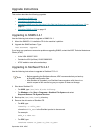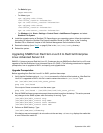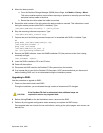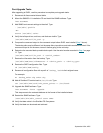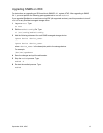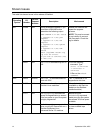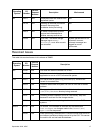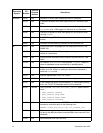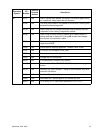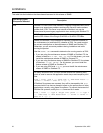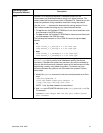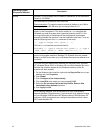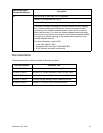
20 September 2004, ADIC
Limitations
This table lists the limitations that have been discovered in this release of SNMS.
Operating System/
Component Affected
Description
IRIX StorNext FS uses 64-bit inode numbers. Programs compiled without 64-bit
support may experience problems working with files with inode numbers
greater than 2 GB. This issue is not unique to StorNext, but may be
encountered by some legacy applications when working with StorNext FS.
SNMS only supports SGI 64-bit versions of IRIX on operating systems that
use the SGI version of the QLogic QLA2200 or QLA2310 FC-HBAs.
SNMS and StorNext FS are shipped as separate, installable streams for
the maintenance (m) and feature (f) releases of IRIX. You need to select
the correct maintenance or feature streams of SNMS and StorNext FS.
Otherwise, you will encounter problems during installation and while
running the product.
Use the uname -aR command to determine the running version of IRIX.
• If you are using the maintenance stream of SNMS or StorNext FS, the
stream is listed as 6.5.19m, 22m, or 23m. For this stream, you must
install the maintenance release of SNMS or Stornext FS.
• If you are using the feature stream of SNMS or StorNext FS, the stream
is listed as 6.5.19f, or 22f. For this stream, you must install the
feature release of SNMS or StorNext FS.
• If you are using IRIX level 6.5.23, you must install the maintenance
stream of SNMS or StorNext FS.
On many versions of IRIX, the root crontab contains the following entry
which is used to remove old application crash dumps and temporary mail
files:
find / -local -type f '(' -name core -o -name dead.letter ')'
-atime +7 -mtime +7 -exec rm -f '{}' ';'
If StorNext file systems are mounted, they will be traversed by this find
command which can have a dramatic impact on the performance of other
applications currently using these file systems. To prevent the traversal of
StorNext file systems, modify the
find command so it reads:
find / -local '(' -type d -fstype cvfs -prune ')' -o -type f
'(' -name core -o -name dead.letter ')' -atime +7 -mtime +7 -
exec rm -f '{}' ';'



